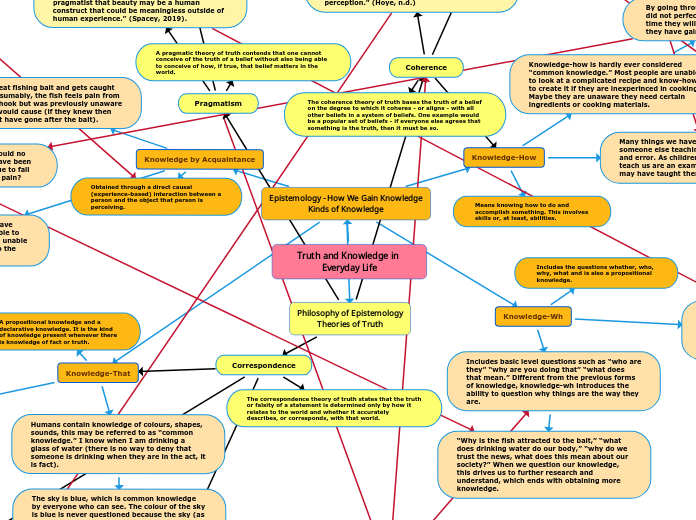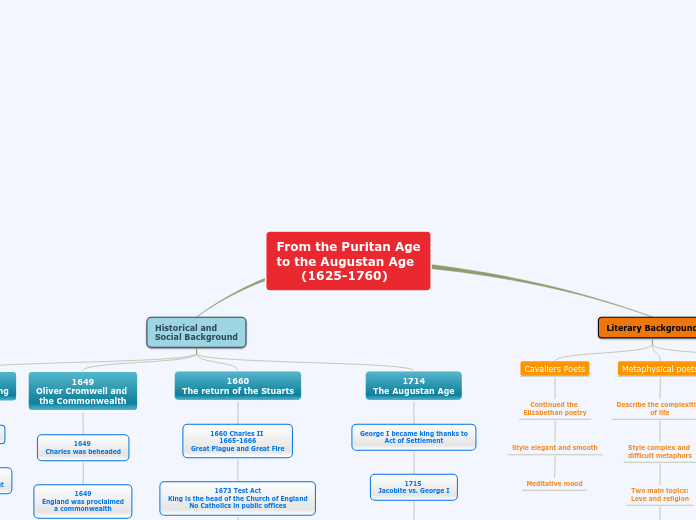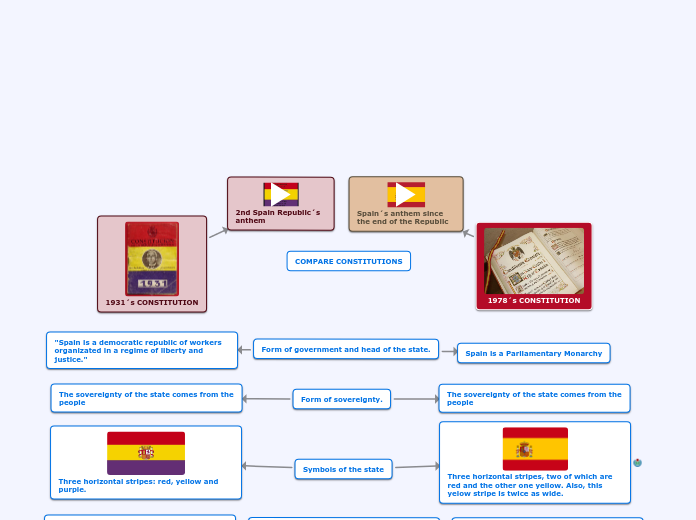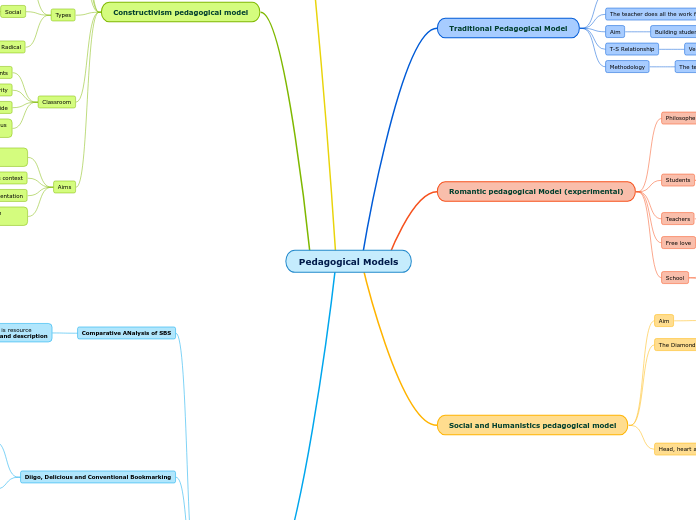Truth and Knowledge in Everyday Life
Epistemology - How We Gain Knowledge
Kinds of Knowledge
Philosophy of Epistemology
Theories of Truth
Pragmatism
A pragmatic theory of truth contends that one cannot conceive of the truth of a belief without also being able to conceive of how, if true, that belief matters in the world.
So, for example, if we say that an apple is red, we cannot say that without taking into account what ‘redness’ is. What emotion does the colour portray? Some might say red is bold, anger, danger, romance, and passion, but how did we come to these conclusions? We also can't deny these either because many people believe in them, therefore it is true.
“For example, if a boxer knows that an opponent is somewhat weak at defending his left side, this may be useful knowledge that isn’t at all certain or concrete.” (Spacey, 2019).
We can inference that the players left side is weak by the way they perform. Are they slower, less coordinated, did they sustain an injury? This information can be perceived.
“A pragmatist can consider something to be true without needing to confirm that it is universally true. For example, if humans commonly perceive the ocean as beautiful then the ocean is beautiful. It doesn’t matter to a pragmatist that beauty may be a human construct that could be meaningless outside of human experience.” (Spacey, 2019).
Coherence
The coherence theory of truth bases the truth of a belief on the degree to which it coheres - or aligns - with all other beliefs in a system of beliefs. One example would be a popular set of beliefs - if everyone else agrees that something is the truth, then it must be so.
Religion is another example. People who are Christian may adapt to this religion because their parents are also Christian. They may read the bible and pray because that is a part of their faith, as well as attend church to join a community of other Christians
Most religious or spiritual people do not question the existence of a Higher Being every day, they just know that it exists because that is what they feel
Even though God may have never existed, there is no way to tell Christians that they cannot pursue their faith because of the massive global population that believes in it.
“For example, when you pick up a ball in your hand and drop it, it isn’t simply our belief about gravity which is tested but also our beliefs about a host of other things, not least of which would be the accuracy of our visual perception.” (Hoye, n.d.)
Correspondence
The correspondence theory of truth states that the truth or falsity of a statement is determined only by how it relates to the world and whether it accurately describes, or corresponds, with that world.
The belief that the sky is blue is true because of the fact the sky is blue. We know this is true because we can look outside and see that the sky is in fact blue. Even on grey cloudy days, or at night when the sky is dark, we know the sky is blue because there will always be another day where it is blue once again.
We can hear the song therefore it is true, even if we do not know how the song is made. We do not question the existence of the song, and though we cannot physically touch music, we are still satisfied.
Other things that may not be fact are still considered true, as the existence of God. This is true because although not everyone believes in a God, there has never been a time in existence where individuals have not heard of the theory of God.
‘The proposition that dogs bark is true if it is a fact that some dogs bark.’ ‘The proposition that God exists is true if it is a fact that God exists.’ ‘The proposition that snow is white is true if it is a fact that snow is white.’
Knowledge-That
Humans contain knowledge of colours, shapes, sounds, this may be referred to as “common knowledge.” I know when I am drinking a glass of water (there is no way to deny that someone is drinking when they are in the act, it is fact).
The sky is blue, which is common knowledge by everyone who can see. The colour of the sky is blue is never questioned because the sky (as far as we know) has been blue for our entire lives.
People watch the news because they want accurate information about the events happening in their area of residence or around the world.
People who watch the news usually do not question if the information being provided is false because if they watch the news they blindly trust the source.
A propositional knowledge and a declarative knowledge. It is the kind of knowledge present whenever there is knowledge of fact or truth.
Knowledge-Wh
Knowledge-wh is not just used for abstract questions, it is used in everyday life in basically everything we do, even if we are not directly philosophically questioning the world around us. Everything holds order in one way or another.
Checking the time and knowing whether it is 4 pm, is therefore knowing it is 4 pm. No one can deny that it is 4 pm because there is only one way to tell time, therefore it is something we know. Knowing that you have to do a certain thing at 4 pm, say taking a form of medication is knowing. Knowing you have to go to an event is knowing, and knowing what the event is for is knowing.
Includes basic level questions such as “who are they” “why are you doing that” “what does that mean.” Different from the previous forms of knowledge, knowledge-wh introduces the ability to question why things are the way they are.
“Why is the fish attracted to the bait,” “what does drinking water do our body,” “why do we trust the news, what does this mean about our society?” When we question our knowledge, this drives us to further research and understand, which ends with obtaining more knowledge.
Includes the questions whether, who, why, what and is also a propositional knowledge.
Knowledge-How
Knowledge-how is hardly ever considered “common knowledge.” Most people are unable to look at a complicated recipe and know-how to create it if they are inexperinced in cooking. Maybe they are unaware they need certain ingredients or cooking materials.
By going through the experience (even if they did not perfectly execute the meal) the next time they will know how to do better because they have gained knowledge by trying.
Many things we have learned have been from someone else teaching us, or by our own trial and error. As children, the things our parents teach us are an example of what their parents may have taught them, and so on.
Learning how to ride a bike requires teaching. Nobody just gets on a bike and automatically knows how to ride, you will need strength, balance, and an idea of how bikes function.
Means knowing how to do and accomplish something. This involves skills or, at least, abilities.
Knowledge by Acquaintance
I know the sound of a song because I have listened to it before. Although we are able to recognize songs for their sound, we are unable to know every factor that contributes to the sound of the song.
The average human is not knowledgeable about the psychoacoustics that contributes to every single sound and song we hear.
A fish tries to eat fishing bait and gets caught by a hook. Presumably, the fish feels pain from the jab of the hook but was previously unaware of the pain it would cause (if they knew then they would not have gone after the bait).
Can fish propose the idea that they should no longer go after worm bait after they have been previously hooked, or will they continue to fall for the bait and continue experiencing pain?
Alternatively, fish will never know what a hook is because they cannot learn about man-made objects in the same way humans do.
Obtained through a direct causal (experience-based) interaction between a person and the object that person is perceiving.









